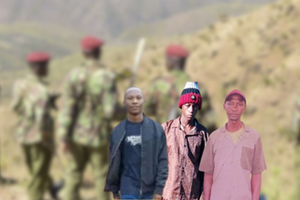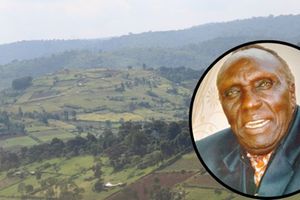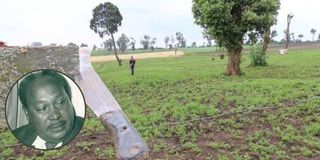
A section of the late Cabinet Minister Mbiyu Koinange’s (inset) disputed 4,200-acre Muthera Farm in Mau Narok, on August 16, 2024. Two rival groups clashed over ownership of the land before police intervened.
The recent tragedy in Angata Barrikoi in Trans Mara South, Narok County, where six residents were shot dead by the police, has cast a spotlight on regions prone to violence due to long-standing land disputes.
The shooting happened after government officials went to forcefully subdivide a disputed land with allegations that influential politicians had grabbed part of it.
Emurua Dikirr MP Johana Ng’eno was captured on a video siding with the residents and telling off government officials for ignoring a court order stopping looming evictions.
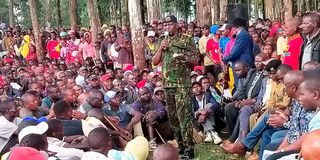
Inspector General of Police Douglas Kanja addresses residents of Angata Barrikoi in Kilgoris, Narok County on April 29, 2025.
As controversy raged over the killings, a group of elders under the banner of Ong’ata Barrikoi Farmers’ Cooperative Society Limited fought back.
In a statement, the elders produced court documents confirming their ownership of the disputed land, supporting the intended government-led demarcation that sparked the deadly confrontation.
Such land disputes are not unique to Angata Barrikoi. Below are several other examples from across Kenya that illustrate the widespread and persistent nature of these conflict.
Kedong Ranch: Will Ruto’s move end long-drawn fights?
On Tuesday, May 6, President William Ruto allocated an additional 6,000 acres of Kedong Ranch to the Maasai community in Narok County, saying the move aimed to expand land ownership among locals. The ranch, part of which hosts the Naivasha Inland Dry Port, has been the subject of long-running disputes. Ruto promised that beneficiaries would receive title deeds within a week.

President William Ruto issues a title deed to Mzee William Kechino Cheringo in Oloonkoliin, Narok County, on May 7, 2025.
“Bring me the names of the intended title deed holders, and I will issue the documents once the list is complete,” he said.
Kedong is not the only land causing controversy. In nearby Sogoo, Narok County, President Ruto also announced plans to purchase a 5,800-acre parcel linked to the late former Nyanza Provincial Commissioner Isaiah Kiplangat Cheluget. The government intends to resettle at least 600 families currently occupying the land, along with 13,500 Mau Forest evictees.
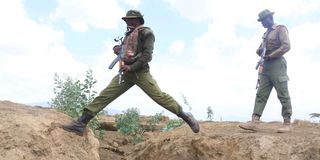
Security officers at a section of Kedong Ranch after it was invaded by herdsmen and squatters.
The Cheluget land has been a source of dispute for nearly two decades. Though squatters claimed to have settled there before 1970, court records show the land was adjudicated in 1974. Both the High Court and the Court of Appeal ruled in favour of Cheluget, affirming his legal ownership.
However, Ruto’s claim that he is in talks with the late PC raised eyebrows, as Cheluget died in 2017.
His family has since clarified that they are engaging with the government regarding the President’s proposal.
Murang’a: Prime plots, deadly fights
In Murang’a County, land ownership remains a source of conflict, with key hotspots including Embakasi Ranching Company Limited, Mbo-I-Kamiti, Samuru Gituto, Kagaa, Muthanga, Nanga Kihoto, Mwireri Mukia, Mithini, and Kihiu Mwiri.

Embakasi Ranching Company Limited chair Phideli Wangari during the burial ceremony of the company’s former chair James Njoroge at Lironi in Kiambu County on September 5, 2023.
A powerful cartel, comprising administrators, ranching boards, police, military, politicians, technocrats, lawyers, members of the Judiciary, and unscrupulous land dealers—has been blamed for the suffering of ordinary shareholders, many of whom inherited land paid for by their parents and grandparents.
Lands Cabinet Secretary Alice Wahome has acknowledged the existence of such cartels, which she says specialise in grabbing land from legal owners.
Kihiu Mwiri Ranching Company has recorded more than 100 deaths over the past two decades, as rival factions clash violently over land control.
In the Mithini land scheme, 1,500 shareholders are fighting for control of 7,000 acres, with eviction threats looming as cartels seek to take over the property.
At Samuru Gituto Farmers’ Cooperative, elderly members are appealing to the State to help them recover their multibillion-shilling land, allegedly stolen through irregular sales. The 1,700-acre dispute has dragged through the courts for years.
Trans Nzoia: Widespread bloodletting over land
Trans Nzoia County has been the scene of repeated and unresolved land clashes. On April 23, 2023, two people were shot during a confrontation over a 1,500-acre parcel in Kampi Ways village, involving residents and the Agricultural Development Corporation.
Earlier, in 2014, six suspected raiders were killed while attempting to forcibly evict families from Mengo Farm in Saboti Constituency. The group had reportedly begun torching houses before they were subdued.
More recently, on April 6, 2024, three people were shot and injured during a land conflict in Mowlem, Endebess region. Despite these deadly incidents, the disputes remain unresolved, fuelling ongoing tension and insecurity in the county.
Mau Narok: Bloody battle over Koinange property
On March 27, 2025, one person was shot dead in Mau Narok, Nakuru County, following a violent clash between rival groups claiming ownership of a disputed 4,296-acre parcel. Njoro Deputy County Commissioner Mokin Ptangu’ny confirmed that the land is at the centre of a long-running feud involving the family of former powerful Cabinet Minister Mbiyu Koinange and that of the late

Former Cabinet minister Mbiyu Koinange. Photo/FILE
.
Kirinyaga: Mwea Trust land a constant problem
In Kirinyaga, the dispute over the controversial 54,000-acre Mwea Trust land remains unresolved. For decades, communities from Mbeere, Embu, Kamba, and Kirinyaga have laid claim to the land. Local and national leaders have repeatedly called for the formation of a commission to determine rightful ownership and end the prolonged conflict, which has claimed lives. In 2019, one person was shot dead and six others seriously injured after police responded to violent clashes between rival groups. Several homes were torched, and property worth thousands of shillings destroyed.
Trans Mara: A protracted inter-clan fight

A woman wails next to her burnt house in Trans Mara West Sub-county, Narok County. The building was torched during land clashes on the Narok and Kisii county border in 2016.
A protracted land dispute between two clans at the Nkararo-Enoosoen border in the volatile Trans Mara West Sub-county has claimed dozens of lives and left scores with injuries over the years. The boundary dispute between the two clans over a more than 30-acre parcel of land started in 1974 and has led to bloodshed for several years. Last year, the government was forced to demarcate the boundary between the two clans in a bid to end the long-standing dispute.
Nakuru: University land among disputed property
In a recent land dispute, Rift Valley Regional Commissioner Abdi Hassan was sucked into the controversy surrounding the ownership of the 2,600-acre Ngongongeri farm in Njoro, Nakuru County, and accused of interference. The administrator was accused of taking sides in the dispute pitting the members of the Mosem Enterprises Limited and the Egerton University.
The over 400 members claimed Dr Hassan was enforcing court orders partially in favour of the university. Through lawyer David Mong’eri, the group in its letter to the Ministry of Interior, cited incidents of harassment and attack where some of their members were arrested and one of them shot by the police.
“One community member, Leonard Kipkemoi who was within the farm, was shot by police. However, no one has been arrested or charged to date,” stated part of the letter by Mr Mongeri.
However, Dr Hassan denied being partisan.
“I have no business interfering with the land which I know has an ownership dispute pending before court. Mine is only providing security and enforcing court orders as expected,” said Dr Hassan.
Dr Hassan admitted that land has been a thorny issue in the Rift Valley region and warned against invading private land.
“While relevant bodies seek to resolve land disputes, let us embrace peace and allow them to do so. Our security personnel are on high alert and will arrest any individuals found invading private property,” Dr Hassan said while addressing the recent invasion of private land in Maai Mahiu and Ndabibi.
Nakuru has had its fair share of land problems. On August 7, 2024, a farm manager was killed in the Ngata area during a confrontation with a group of people who had invaded a piece of land in Menengai.
Voi: Catholic Church allowed to evict squatters
The Catholic Church in Voi, which is under the Archdiocese of Mombasa, intends to fully execute a judgement in which the court ordered tens of squatters to vacate its 40-acre parcel of land by April 30.
Through its lawyer Augustus Khisa, the Catholic Church had written a letter seeking to have all the squatters move out of the land in fulfilment of the judgement of the Environment and Land Court (ELC) in Mombasa which was affirmed by the Court of Appeal.
“Kindly therefore inform all your clients to vacate the land by April 30 in default the church shall have all trespassers forcefully evicted,” read a letter by the church dated April 8 to the squatters’ lawyers.
After the Court of Appeal and the ELC made their decisions, the church applied for the execution of the decree which was allowed.
“The court is of the view that as long as the decree issued remains in force, there is no good reason why execution should not proceed, the defendants have clearly come to the end of the road and must abide by the terms of the decree,” ruled in the court following an application for its (decree) execution.
The squatters were also ordered by the ELC to pay the church Sh500,000 as general damages for trespass.
Muhoroni: 500 acres pitting Abura’s family and cooperative society
At the border of Kisumu and Nandi counties, a parcel of land owned by the family of the late musician Achieng Abura has been ongoing for years.
The land dispute escalated after Justice Samson Okong’o of the Environment and Land Court ruled on December 9, 2024, that the Usonik Farm Purchase Cooperative Society members were trespassers.
The ruling ordered the group to vacate the land and pay Sh20 million in lost profits and an additional Sh10 million in damages to Abura’s family.
The farmers claimed to have acquired the land through Achieng’ Abura’s late brother, Jack Abura, but the judge found no evidence of a valid agreement or payment of the alleged Sh500,000 deposit.
After they lost a case before a Kisumu court, the farmers mostly from Nandi are now seeking dialogue and alternative dispute resolution to avoid eviction from the place they have called home for a decade.
The eviction was set to take place in February following a court ruling.
Taita Taveta: Locals versus sisal firm
Taita Taveta communities in April suffered a major setback after the court declined to reverse an earlier ruling that would have restored ownership of prime land — including expansive ranches measuring over 16,930 acres — back to them.
Justice Edward Wabwoto of the Environment and Land Court in Voi ruled that the application to review the court’s previous orders did not meet the threshold required to warrant the grant of the relief sought.
The community, under the umbrella of the Mwasima Mbuwa Welfare Association, had moved to court in February this year seeking to set aside and review the judgement delivered on October 23,2024, which had dismissed their petition for lack of sufficient evidence.

Mwasima Mbuwa Welfare Association's legal advisor Tom Nduku (left) and the secretary of the association Mnjala Mwaluma in an interview in Voi, Taita Taveta County.
In the judgement delivered last year, Justice Wabwoto ruled that the land parcels in question had been lawfully acquired by Teita Estate Sisal Ltd and that the firm was the bona fide and legal owner of the suit properties.
Kisauni: Locals versus private firm
In Kisauni, Mombasa County, the fate of more than 1,200 squatters residing on a 341-acre piece of land is uncertain after Mombasa declined compensation of Sh1.7 billion to the landowner to allow the squatters to settle on the property.
Instead, Environment and Land Court Judge Stephen Kibunja had given a 60-day window for the relevant government agencies and the squatters to engage with Mainland Properties Ltd’s management for a permanent solution.
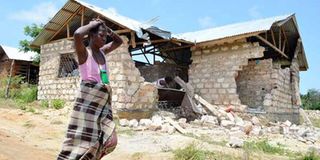
A woman ponders her next move on October 3, 2016 after her house was demolished at Utange-Kibaoni in Mombasa by a private developer.
Mainland Properties Ltd moved to court in 2018 to request various orders, including police assistance in evicting trespassers and individuals unlawfully occupying its property. The company also sought general damages for the infringement of its property rights and freedoms.
Reporting by Ruth Mbula, Domnic Ombok, Mwangi Muiruri, George Munene, Martin Mwaura, Eric Matara, Joseph Openda, Philip Muyanga, Vitalis Kimutai, Toby Messo, and Brian Ocharo

